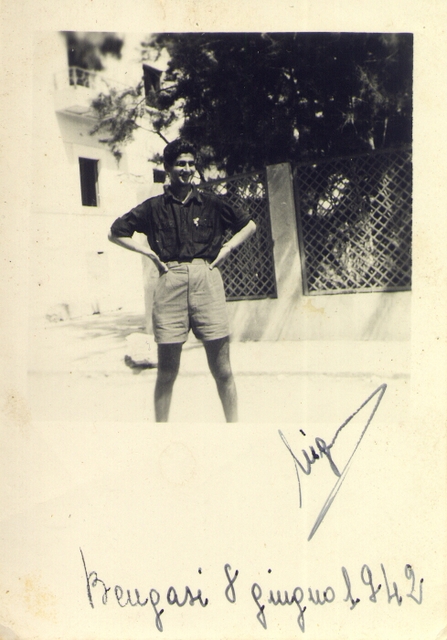My Father’s War – Part 3 Posted by Serena on Jul 30, 2015 in Italian Language
Here is part 3 of my father’s war memories in which he recounts being taken prisoner during the final retreat in North Africa.
If you haven’t already read them, here are Part 1 and Part 2.
Aprile – maggio 1943: terza e ultima ritirata da Bengasi fino alla Tripolitania. La battaglia finale è stata al confine con la Tunisia, nella zona di Enfidaville. Noi eravamo giù nella valle e gli Alleati erano su nei monti. Ci hanno bombardato tutta la notte, il cielo era infuocato, per fortuna la maggior parte delle cannonate ci passavano sopra alla testa. La mattina all’alba c’è stata la resa finale agli inglesi.
April-May 1943: third and last retreat from Benghazi to Tripolitania. The final battle took place on the Tunisian border, in the Enfidaville area. We were down in the valley, and the Allies were up in the mountains. They bombarded us all night, the sky was on fire, luckily most of the shells passed over our heads. The following morning at dawn we finally surrendered to the English.
Al momento della consegna dei prigionieri il mio amico Ulderico Colombo si è reso conto che io indossavo ancora la divisa della Milizia. “Ma sei matto ad andare in giro con la camicia nera? Se gli Alleati ti vedono chissà cosa ti fanno” mi ha detto Ulderico strappandomi la camicia nera di dosso e dandomi una sua camicia kaki. “E che è? E’ una camicia come un’altra” gli ho risposto io.
As the prisoners were handed over my friend Ulderico Colombo realized that I was still wearing my Militia uniform. “Are you crazy going around with that black shirt on? If the Allies see you who knows what they’ll do to you” said Ulderico, tearing the black shirt off me and giving me one of his khaki shirts. “What’s all the fuss about? It’s just a shirt like any other” I replied.
Dapprima ci hanno preso gli inglesi, ma ci hanno subito passato ai francesi che volevano prigionieri italiani da far lavorare nelle loro fattorie in Nord Africa. In cambio gli inglesi si sono fatti dare dai francesi truppe nordafricane da mandare a combattere sul fronte in Europa.
First of all, the English took us prisoner, but they quickly handed us over to the French who wanted Italian prisoners to work on their farms in North Africa. In return the English had the French give them North African troops to send to fight on the front in Europe.
All’inizio ci hanno portato in un campo di concentramento a Kairouan in Tunisia. Dopo poco tempo ci hanno caricati su un treno merci e ci hanno messi nei vagoni di legno che avevano la dicitura “Cavalli 8 Uomini 40”. Eravamo più di una sessantina in ogni vagone: eravamo così stipati che non ci si poteva neanche sedere, dovevamo stare sempre in piedi. Il treno camminava la notte e di giorno restavamo fermi nelle stazioni sotto il sole di giugno. Non potevamo aprire i portelloni sennò i francesi ci sparavano perché avevano paura che scappassimo. Il viaggio è durato diversi giorni: dalla Tunisia abbiamo viaggiato fino a Marrakesh in Marocco!
In the beginning they took us to a POW camp in Kairouan, Tunisia. Shortly afterwards they loaded us on a goods train and put us in wooden wagons on which was written “Horses 8, Men 40”. There were more than sixty of us in each wagon: we were so crammed in that we couldn’t even sit down, we had to stand up all the time. The train travelled at night and during the day we stayed put in the railway stations beneath the June sun. We couldn’t open the doors or the French would shoot us because they were afraid that we might escape. The journey lasted several days: we travelled all the way from Tunisia to Marrakesh in Morocco!
To be continued …

Build vocabulary, practice pronunciation, and more with Transparent Language Online. Available anytime, anywhere, on any device.







Comments:
paolo:
… that we couldn’t even sit down – …che non ci si poteva neanche sedere.
Per favore correggermi se sbaglio ma “ci” funzione qui come “si” (impersonale riflessivo) evitando il doppio “si si”, siccome sedersi è riflessivo?
È possibile anche tradurre questo come ” … che non ci potevamo neanche sedere.
Serena:
@paolo Salve Paolo!
Sì, ci serve ad evitare il doppio si nella forma impersonale dei verbi riflessivi. E anche la frase ‘… che non ci potevamo neanche sedere’ va benissimo. Bravo!
Piccola correzione: mi sono dimenticato il punto interrogativo alla fine della frase ultima. E’ meglio mettre l’aggettivo ‘ultimo/a’ prima del nome, cioè: … nell’ultima frase.
A presto
Serena
paolo:
(mi sono dimenticato il punto interrogativo alla fine della frase ultima)
paolo:
Grazie e grazie per la correzione.
john:
I am researching D’aosta barracks and its history. I did my schooling there in the early 1960s. I would like to know which Turkish British, German Italian regiments served there from 1911 to 1968 when it closed and handed over to the Libyan army. I believe it was demolished by Gedaffi about 1974